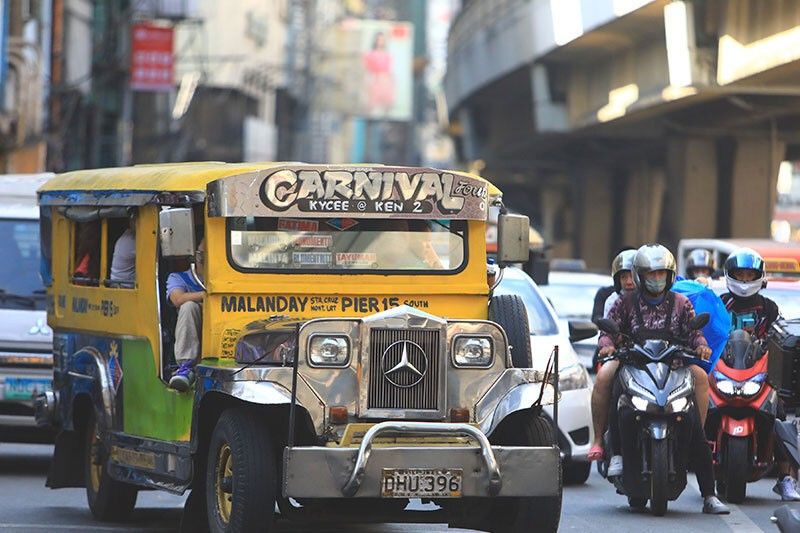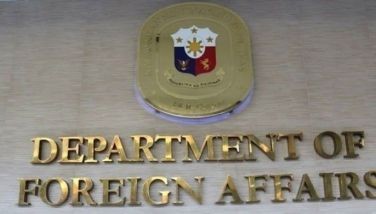Palace says Metro PUV operation has normalized

MANILA, Philippines — The operation of public transportation in Metro Manila has normalized, Malacañang said, as the weeklong strike of transport groups opposed to the government’s public utility vehicle (PUV) modernization program entered its second day.
Citing a report by the Inter-Agency Task Force on Tigil Pasada, Presidential Communications Secretary Cheloy Garafil said PUV operations in the capital region have “normalized” but isolated presence of rallyists was observed in some parts of the metropolis.
Protesters were monitored at the Heritage in Baclaran, Old Terminal in Alabang, Monumento in Caloocan City and Catmon/St. Francis St. in Malabon, she added.
“The Metro Manila local government units and different government agencies have successfully assisted commuters affected by Monday’s transport group strike, which authorities said, failed to cause major disruption in the metropolis’ public transportation,” Garafil said in a statement.
In an interview on GMANews, Land Transportation Franchising and Regulatory Board (LTFRB) Technical Division head Joel Bolano said only about 10 percent of routes in Metro Manila were affected based on reports from its Metrobase Command Center.
The Metropolitan Manila Development Authority (MMDA) has reported that national and local governments have mobilized 130 vehicles that served 4,794 affected passengers. As of March 6, there were no reported incidents requiring emergency preparedness and asset deployment, the MMDA added.
The Pinagkaisang Samahan ng mga Tsuper at Operator Nationwide (Piston) claimed the strike paralyzed 95 percent of transportation in Metro Manila last Monday. The government has denied this, saying protesting transport groups did not cause major disruptions.
Relatively peaceful
The first day of the weeklong transport strike by jeepney operators and drivers was relatively peaceful, the Philippine National Police (PNP) reported yesterday.
Based on the reports from their field units, PNP spokesperson Col. Jean Fajardo said no untoward incident related to the transport strike was recorded.
“The transport strike was generally peaceful because we did not record any untoward incident,” Fajardo said over CNN Philippines.
The PNP remains on heightened alert status, according to Fajardo, so they can provide additional security and public safety services to commuters who are affected by the lack of public transport. Under heightened alert status, around 80 percent of the PNP are available for deployment.
No untoward incidents have happened and the situation is generally peaceful in the second day nationwide transport strike in Calabarzon region, according to Calabarzon police officials.
‘I am with you’
Sen. Bong Go yesterday urged the government to implement measures to support those affected by the PUV modernization program, as he expressed his solidarity with the jeepney drivers.
“To jeepney drivers, I am with you. I sympathize with you. I understand your attitude. I understand that times are hard right now,” said Go on Monday.
While he clarified that he is not totally against the modernization program, Go has reiterated that the government should give traditional jeepney operators sufficient support for the transition and more time to adjust to requirements.
“Let’s first give a grace period, enough time for our jeepney drivers to adjust and comply with our modernization program,” he said.
“The modernization program will bring good things in the long term. But for me, now most of the drivers are making a living and feeding themselves,” he added, acknowledging that most drivers are struggling to make ends meet and cannot afford to buy new vehicles.
No stopping strike
There will be no stopping the weeklong transport strike as long as the government does not junk its modernization requirements, according to transport groups Piston and Manibela.
“On our part, there must be a clear solution, the President must release an order that junks the omnibus franchise guidelines because this is the root of the struggle of the public transport,” Piston president Mody Floranda said over dzRH.
His group is urging the government to allow the rehabilitation of jeepney units instead of acquiring new models costing millions of pesos.
Manibela president Mar Valbuena has also appealed to President Marcos to step in and revoke the memorandum circular of the LTFRB extending the deadline for the consolidation requirement of operators.
For his part, LTFRB Chairperson Teofilo Guadiz said that the iconic look of traditional jeepneys can be retained alongside ensuring that the units are safe and roadworthy.
Legal teams for drivers
The National Union of People’s Lawyers (NUPL) has created legal teams for jeepney drivers in anticipation of any form of harassment, injury or illegal arrests during the weeklong transport strike.
The NUPL said its Quick Reaction Teams would provide legal services to jeepney drivers and other supporters if they are illegally arrested, harmed or harassed.
“Except in instances presenting clear and present danger, state forces are explicitly prohibited from interfering with the ongoing nationwide strike. Government is thus warned that arbitrary arrests, physical harm, or any form of harassment by state forces will be unconstitutional,” NUPL said.
Join cooperatives
Caritas Manila executive director Fr. Anton Pascual yesterday said that while he empathized with the jeepney drivers, he also urged them to join cooperatives that would pave the way in modernizing public transport.
In an interview over the Church-run Radio Veritas, Pascual said that the government should give jeepney drivers more time for them to comply with the planned modernization. He also asked the Catholic faithful to pray so those in the transport sector would be able to find a solution to the problem.
Pascual likewise urged the jeepney drivers and their operators to be part of a cooperative that could help them finance the purchase of new vehicles for public transport.
“The cooperative is a very good program that would strengthen what we call the ‘church of the poor.’ The church is pro-poor and instead of begging for alms, we could work toward having a society that would grow rich and use it to help the poor,” the priest added. – Ed Amoroso, Cecille Suerte Felipe, Neil Jayson Servallos, Evelyn Macairan, Romina Cabrera, Emmanuel Tupas
- Latest
- Trending































